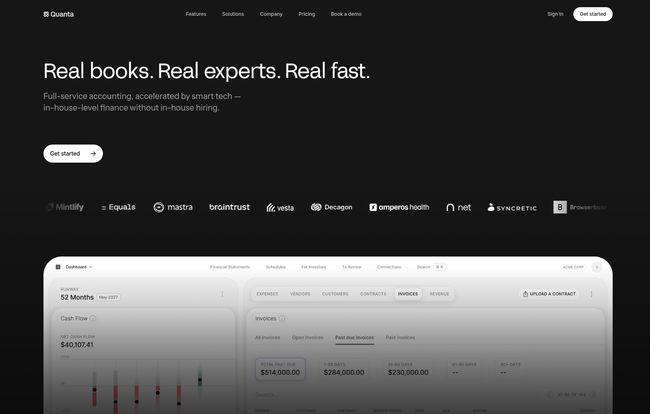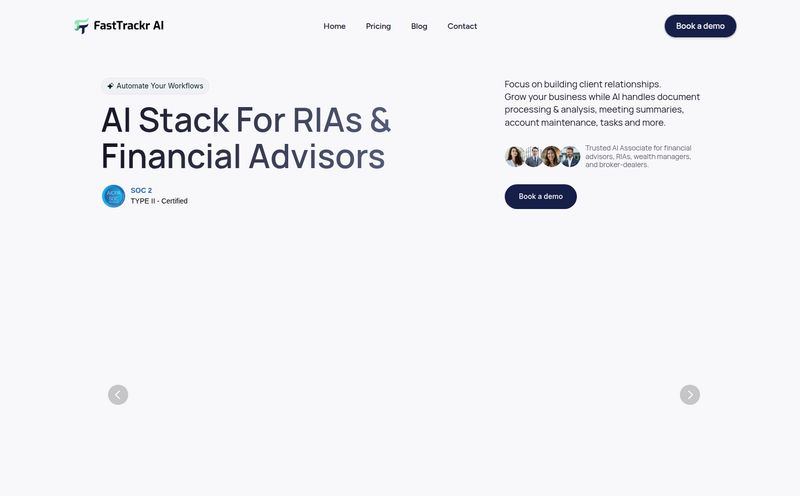For most of us in the software and digital space, accounting is a four-letter word spelled with ten letters. It’s that thing you know is important, but it always feels like you're looking at a blurry photograph of the past. You get a report on the 15th of the month telling you how you did… last month. How are you supposed to steer the ship when you’re getting navigation updates via snail mail?
I’ve been in the SEO and traffic game for years, and I’ve seen countless promising software businesses get tangled up in their own financials. They have a killer product, they’re generating traffic, but their books are a mess. It’s a classic story. So when I see a tool that claims to offer “Real books. Real experts. Real fast,” my ears perk up. That tool is Quanta, and I decided to take a closer look.
This isn't just another software review. This is me, a business operator, looking at whether this thing can actually solve one of the most persistent headaches for software companies.
So What Exactly is Quanta, Anyway?
First off, calling Quanta just an “accounting software” is like calling a Tesla just a car with a big iPad. It misses the point. Quanta is a hybrid service. It’s their own proprietary AI-powered accounting system fused with a team of actual, breathing human accounting experts. And the most interesting part? It’s built specifically for software businesses.
This isn't a one-size-fits-all solution for your local bakery and your buddy’s SaaS startup. By focusing on software, they can get really good at the things that matter to us: recurring revenue, ASC 606 compliance, tracking MRR, and all that fun stuff that makes traditional accountants scratch their heads. They're aiming to replace the clunky, slow process of using a separate bookkeeper (who might be in a completely different time zone) and a separate software, and instead, roll it all into one slick operation.
The Core Features That Actually Matter
A features list can be boring, I get it. But with Quanta, the features tell a story about the problem they're trying to solve. Let's break down the big ones.
Real-Time Financials: No More Waiting for Month-End
This is the big one for me. Traditional accounting is reactive. You close the books for May sometime in mid-June. Quanta's whole model is built on continuous, real-time accounting. Your data is reconciled daily. This means the financial dashboard you’re looking at today reflects what's happening... well, today. It's the difference between reading yesterday's newspaper and watching a live news feed. For making quick decisions on ad spend, hiring, or expansion, that difference is everything.
The AI-Powered Brains of the Operation
The “how” behind the real-time data is their AI system. It automates the grunt work—categorizing transactions, reconciling accounts, and most importantly for SaaS, handling revenue recognition. If you’ve ever had to deal with ASC 606 compliance, you know it can be a nightmare of spreadsheets and manual calculations. Quanta automates this, which not only saves time but also reduces the chance of human error. It’s about letting the machines do what they do best, so the humans can do what they do best.
Human Experts on Tap (Hello, Slack!)
And speaking of humans, this might be my favorite part. Quanta gives you a dedicated Slack channel with their team of accountants. Let that sink in. No support tickets that go into a black hole. No scheduling a call for next Tuesday to ask a simple question. You have a question about a weird charge from AWS or how to categorize a new marketing expense? You just pop it in Slack. This is how modern teams work, and it’s brilliant that they've integrated their service right into that workflow. It feels less like an outsourced firm and more like a fractional finance team that just happens to live in your Slack workspace.

Visit Quanta
Who is Quanta Really For?
Let's be clear: Quanta has picked a lane, and they are staying in it. They are built for software businesses. From the ground up. This includes:
- Founders of early-stage startups who need clean books for fundraising and can't afford a full-time finance person.
- Heads of Finance at growing companies who need more sophisticated reporting, department-level tracking, and a reliable system that scales.
- First Business Hires at a tech company who suddenly find themselves responsibile for everything from marketing to making sure the bills get paid.
If you're selling physical products on Shopify or running a brick-and-mortar agency, this probably isn't the solution for you. And that’s okay. That focus is their strength. They’re not trying to be everything to everyone, and in my opinion, that's a sign of a company that truly understands its customers' pain points.
Let's Talk Money: Quanta's Pricing Tiers
Alright, the all-important question. What’s this going to cost? Pricing isn’t front-and-center on their homepage, but they have a dedicated page that lays it all out. They run on a typical three-tiered SaaS model, but it's important to remember you're buying a service, not just a login.
| Feature | Early Stage | Growth | Enterprise |
|---|---|---|---|
| Best For | New & Pre-revenue | Revenue-generating | Heads of Finance & Teams |
| Real-time Reporting | ✔️ | ✔️ | ✔️ |
| Slack Channel | ✔️ | Priority SLA | Priority SLA |
| Revenue Recognition | ✔️ | Customizable | Customizable |
| Department-level Accounting | ❌ | ✔️ | ✔️ |
Then there's the Tax Filing Add-On. This is critical to know. It starts at $2,500 per year and covers your Federal and one State corporate income tax filing. Additional states are extra. They also offer R&D tax credit services, but they take a 7.5% cut of the credit, which is a fairly standard practice.
My take? This is not priced for the solo-bootstrapper coding in their garage. This is for the serious, funded, or revenue-generating business that understands that good financial management is an investment, not an expense.
My Final Take: Is Quanta Worth the Investment?
After digging in, I'm genuinely impressed. The biggest hurdle for any business service is a combination of trust and efficiency. The old way of doing things—DIY with QuickBooks until it breaks, then hiring a traditional firm that doesn't understand your business model—is broken for software companies.
Quanta sits in a really interesting sweet spot. It's more hands-on and specialized than a pure software tool, but more efficient and integrated than a traditional accounting firm. The combination of a purpose-built platform and direct expert access through Slack is powerful.
Some might argue that the niche focus on software is a limitation. I see it as their greatest strength. They’re not distracted. They know the customer, they know the problems, and they’ve built a solution laser-focused on solving them.
Is it right for you? If you’re a growing software business tired of flying blind with stale financial data, and you see the value in having experts in your corner (or in your Slack), then I think you definately owe it to yourself to book a demo. It could be the move that finally lets you focus on building your product instead of wrestling with spreadsheets.
Frequently Asked Questions about Quanta
- What kind of businesses is Quanta best for?
- Quanta is designed exclusively for software and SaaS businesses. This includes everything from new, pre-revenue startups to larger, scaling companies with dedicated finance teams.
- Is Quanta just an accounting software?
- No, it's a full-service solution. It combines their proprietary, AI-powered accounting platform with a dedicated team of human accounting experts you can access directly via a Slack channel.
- How much does Quanta's tax filing cost?
- Tax filing is a separate add-on service that starts at $2,500 per year. This covers federal and one state filing. Additional services, like claiming an R&D tax credit, have their own fees.
- Can Quanta replace my CPA?
- For day-to-day accounting, bookkeeping, and standard tax filing, yes. However, Quanta is not a public accounting firm, which means they can't perform certain licensed services like financial audits. You might still need a CPA for those specific, high-level functions.
- What tools does Quanta integrate with?
- It integrates with the tools that are central to a software business's financial stack, including Stripe for payments, Gusto for payroll, and banking platforms like Brex and Mercury.
- How do I actually communicate with the accountants?
- The primary communication method is through a dedicated, private Slack channel. This allows for quick questions and a much more responsive feel than traditional email or support ticket systems.



